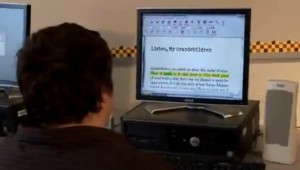Which students qualify for Bookshare in the United States?
This is an important question for American students with disabilities, since Bookshare is the largest online library designed to provide accessible eBooks to people who cannot read standard print.

The answer: it’s only about copyright.
It’s not about special education, and not about special education disability categories.
It’s not about 504 plans or Individualized Education Programs.
It’s not about state policy, or local policy.
It’s not about private schools or home schools.
It’s not about medical doctors.
It’s not about whether your teacher or professor, parent or spouse thinks you should qualify.
It’s not even about whether Bookshare’s staff thinks you should have access.
This surprises a lot of people, which is why we’re writing this blog. There’s a lot of confusion about this, especially in education because Bookshare serves over a quarter million American students with disabilities.
The social deal that makes a library like Bookshare possible is built into American copyright law. The copyright law (Section 121) says that we only will serve people who have a disability that gets in the way of reading print. That’s what we call print disabilities.
And, the only way someone qualifies is if an expert (called a competent authority in the law) assesses your print disability and is willing to sign a form saying that in their professional opinion, you have a disability that significantly interferes with reading print. That’s it.
A person who can get a bona fide expert who qualifies under the law as a competent authority to determine (in good faith) that that person has a qualifying print disability is eligible to become a Bookshare member and download over 200,000 accessible titles (there’s one caveat that applies to about 5,000 books: I’ll get to that one at the end).
The fact that it’s only about meeting the copyright law requirement means that when people ask us a whole bunch of other qualification questions, the answer is rarely yes or no. Here’s a sample list:
Q: Do students with Individualized Education Plans (IEPs) qualify for Bookshare?
A: Some do, some don’t.
Q: Do students with 504 Plans qualify for Bookshare?
A: Some do, some don’t.
Q: Do students with learning disabilities qualify for Bookshare?
A: Some do, some don’t.
Q: Do students with dyslexia qualify for Bookshare?
A: Some do, some don’t.
Q: Do students with autism qualify for Bookshare?
A: Some do, some don’t.
Q: Do students with hearing problems qualify for Bookshare?
A: Some do, some don’t.
Q: Do students with mental illness qualify for Bookshare?
A: Some do, some don’t.
Q: Do students with disabilities who go to private school or are schooled at home qualify for Bookshare?
A: Some do, some don’t.
Q: Our state says that students with learning disabilities need to have a medical doctor certify them. Do students without such certification qualify for Bookshare?
A: Some do, some don’t.
Q: Our school has agreed to provide digital materials to certain students with disabilities. Do these students qualify for Bookshare?
A: Some do, some don’t.
I think you get the idea. So, when we try to get clearer, we end up going back to the copyright law, which we think is reasonably clear. But, we depend on an expert examining the person in question to make the decision: our staff can’t make these decisions because we don’t have the professional credentials to assess disability.
So, here’s a new list of questions and answers, based on the copyright framing:
Q: Do students who are blind or legally blind qualify for Bookshare?
A: Yes, as long as someone who is a competent authority says that they are legally blind. Legal blindness is a standard built into the law.
Q: Do students who have dyslexia qualify for Bookshare?
A: Yes, as long as someone who is a competent authority says so, which involves assessing that the dyslexia significantly interferes with reading.
Q: Do students who have physical disabilities qualify for Bookshare?
A: Yes, as long as someone who is a competent authority says so, which involves assessing that their physical disability significantly interferes with reading.
That’s basically it, although you can read more — and see examples of competent authorities — on Bookshare’s qualifications page.
The same points in this blog apply to American adults who are not students, as well as to our many users in other countries, although national laws may apply things slightly differently.
So, the one caveat? Part of Bookshare’s collection includes roughly 5,000 textbooks that come to Bookshare from a special repository for K-12 educational materials, called the National Instructional Materials Accessibility Center (the NIMAC).
The NIMAC was set up under the Individuals with Disabilities Education Act of 2004 (IDEA), and books that come from the NIMAC can only be provided to students who are covered by the IDEA law AND the copyright law.
In special education lingo, these are students who have both IEPs and who meet the qualifications under the copyright law. So, these NIMAC books are only available through American public K-12 schools who can confirm which of their students with copyright-qualifying disabilities also have IEPs.
Interestingly, the copyright law enables us to scan the exact same textbooks we get from the NIMAC, without these restrictions. But, these tend to be complex textbooks that are expensive to scan and proofread, so we try to use our limited book scanning budgets for books that aren’t already in the Bookshare collection.

In conclusion, access to Bookshare is fundamentally limited to those people with a disability that significantly interferes with reading, assessed by a competent authority with the professional expertise to assess that disability, meeting the standards set forth in U.S. copyright law and regulations or the equivalent in other countries. We want to serve this community with the best services we can devise to help ensure that a disability that interferes with reading print is not a barrier to education, employment or social inclusion.
At the same time, we value our relationships with publishers and want them to trust us enough to keep providing books. Adhering to the copyright laws is not only the right thing to do; it’s in members’ best interest as well.
Post written by Jim Fruchterman, Benetech/Bookshare Founder and CEO.

Be First to Comment